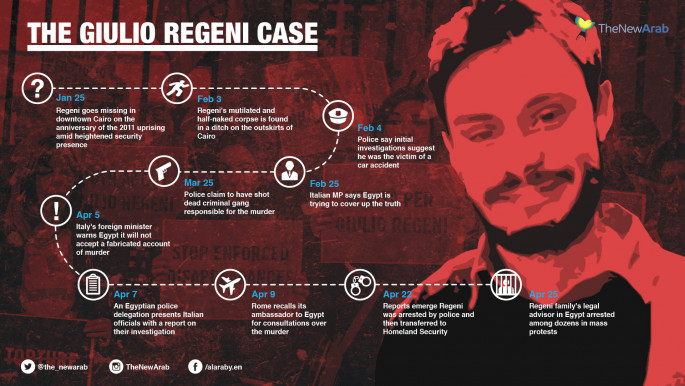Egypt drops 'rough diplomacy' with Italy over Regeni case
Egypt has said it will not adopt a "confrontational stance" against Italy in response to a series of punitive measures by Rome following the murder of Italian student Giulio Regeni in Cairo last January.
A joint Egyptian parliamentary committee said it would not respond negatively to the "hostile reaction" to Egypt from Rome, and instead would maintain "soft diplomacy" in dealing with the case, Chairman Kamal Amer told reporters.
"In the short term we decided that 'rough diplomacy' or 'a confrontational stand' should be ruled out in favour of adopting soft diplomacy," said Amer, the former chief of Egyptian military intelligence.
Regeni, a 28-year-old Italian PhD student who was researching Egyptian trade unions in Cairo, went missing on 25 January, the fifth anniversary of the 2011 revolution against former President Hosni Mubarak.
His mutilated body was found a week later at the side of a road on Cairo's outskirts.
Evidence suggesting he died under torture at the hands of security services during interrogation, although the Egyptian government has strongly denied the accusations.
The heads of the parliament's human rights, foreign affairs, and national security committees were among the participants to agree the "soft" diplomatic response to Italy's measures against Egypt.
"They all agreed that these proposals should be based on quiet and soft diplomacy," he explained.
"It was also agreed that a crisis management group be formed to follow up the developments of the Regeni crisis."
 |
| [click to enlarge] |
According to Amer, the joint parliamentary committee will become a permanent body charged with gathering information from prosecution authorities investigating the case.
He also said the joint committee had proposed that Egyptian parliamentary delegations pay visits to European parliaments to discuss the case.
"We proposed that Egyptian parliamentary delegations visit some European parliaments in Italy, France, England, and Greece," said Amer.
"The fact-finding committee will be also tasked with assuring whether Italy intends to maintain its recent decision not to supply Egypt with spare parts [for] F16 fighter aircraft."
This relates to a decision by the Italian senate to halt the supply of F16 spare parts to Egypt.
The vote marked the first economic sanctions by Italy against Cairo.
Earlier in June, Regeni's parents called on the EU to implement sanctions on Egypt during at a meeting with a human rights committee in Brussels.
Regeni's killing has poisoned Egypt's once-close relations with Italy. Rome recalled its ambassador to Egypt in April to protest what it said was the slow pace of the investigation and the perceived lack of cooperation.
![Giulio Regeni vigil - Rome [AFP] Giulio Regeni vigil - Rome [AFP]](/sites/default/files/styles/image_345x195/public/media/images/8D15998F-4B03-4753-98CF-A640723E0B9E.jpg?h=d1cb525d&itok=6TSJnzlP)




 Follow the Middle East's top stories in English at The New Arab on Google News
Follow the Middle East's top stories in English at The New Arab on Google News
![Israeli forces ordered bombed Gaza's Jabalia, ordering residents to leave [Getty]](/sites/default/files/styles/image_330x185/public/2176418030.jpeg?h=a5f2f23a&itok=_YGZaP1z)

